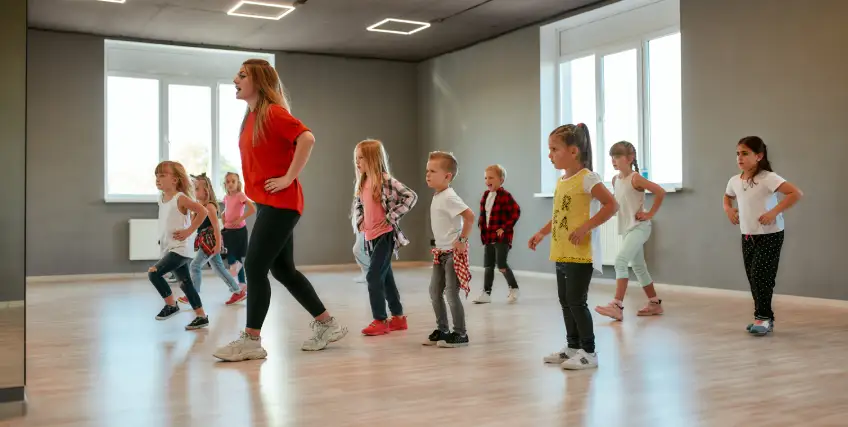Popular Financing Options for Starting or Expanding a Dance Studio
August 19, 2025 | Last Updated on: August 20, 2025

As a small business owner, if you’re thinking of running your own dance studio, it surely requires passion, planning, and most importantly, capital. Many dance studio owners dream big but fall short due to funding problems. However, if you’re in the U.S. and want to start or grow your own dance studio, it’s important to draft a detailed dance studio financial plan.
The goal isn't just to open your doors in the dance industry, it’s to sustain a successful dance studio long-term. This requires understanding your startup costs, knowing your target market, and planning for revenue stability. Hence, financing for business can help you manage your cash flow and unlock new opportunities for growth.
In this article, we’ll explore the best financing options available to start or expand a dance studio. We’ll also discuss the costs involved when creating a dance studio financial plan, the benefits of business financing, and how to choose the right loan option.
Estimating Costs: Building Your Dance Studio Financial Plan
It's important to plan your finances before diving into business funding options. Your dance studio financial plan should give you a clear and honest view of your financial responsibilities. As a result, this step sets the tone for how effectively you can manage your startup costs, operating expenses, and long-term business goals.
However, without a proper roadmap it becomes difficult to maintain a positive cash flow or demonstrate profitability to potential leaders. No matter if you’re launching a brand-new studio or expanding your current location, a thorough financial forecast ensures you’re better prepared for what’s ahead.
When drafting a dance studio business plan, there may be many hidden and visible costs involved. These costs often change depending on whether you’re just starting out or expanding your existing business. Here’s what to consider:
- Studio Space: The first foremost important cost is renting or leasing that can vary by city and square footage. Additionally, renovation projects typically involve flooring, mirrors, lighting, and high-quality sound systems.
- Equipment and Supplies: Your dance studio financial plan may also require studio management software, office furniture, dance barres, and sanitation tools.
- Operating Costs and Staff: Hiring experienced dance instructors can elevate class quality. Moreover, day-to-day operating expenses include utility bills, cleaning, and maintenance.
- Marketing Strategies and Promotions: For promoting your dance studio, you need to invest in social media ads, event sponsorships, and referral programs. Therefore, creating a detailed marketing strategy helps attract new students and increase enrollment.
- Licensing, Legal, and Insurance: Every small business need insurance, business licenses, and compliance filings. Make sure your dance studio's financial plan includes these costs.
Hence, creating a dance studio business plan helps define your target market, services, and pricing structure. Also, a business plan template or financial spreadsheet makes this easier.
When getting funding for your business, most lenders often ask for an income statement, balance sheet, and cash flow statement. So, make sure you have all the necessary documents along with a detailed dance studio financial plan.
Some of the Best Financing Options for Dance Studio Businesses
If your dance studio's financial plan includes securing necessary funding, you need to have clear documentation for your financial projections, cash flow, and revenue streams. There are various types of financing options available for dance studio business owners to choose from. Also, many entrepreneurs choose a mix of financing sources for their business.
Here are some of the popular financing options that work well for dance studios.
SBA Loans
SBA loans are backed by the U.S. Small Business Administration and are designed to support small businesses with more favorable terms than bank loans. These loan options often come with lower interest rates and longer repayment terms, making them one of the best financing solutions available for entrepreneurs. However, to qualify for SBA loans, you’ll need a strong business plan, complete financial projections, market analysis, and cash flow estimates.
Dance studio owners can use SBA loans in various ways as part of their dance studio financial plan. They can use them to cover startup costs like renovation, equipment purchases, hiring staff, or launching marketing campaigns. Additionally, they’re a great fit for dance studio expansion such as opening a second location or upgrading your existing space.
Term Loans
Term loans offer a lump sum loan amount to small business owners that can be repaid over a set period of time. These loans often come with fixed interest rates and a fixed repayment structure. Moreover, term loans can be short-term or long-term, depending on the amount borrowed and repayment period.
Dance studio owners can use term loans for significant expenses such as building studio space, purchasing specialized equipment, or funding renovations. If you’re launching new class schedules, expanding to new dance styles, or opening a second location, term loans can cover those high-cost investments being a part of your dance studio financial plan.
Business Line of Credit
A business line of credit is a flexible financing option that offers quick access to funds when needed, up to a set credit limit. Small business owners can borrow funds easily while paying interest only on the amount used.
Dance studio owners can use a line of credit to cover short-term recurring expenses or seasonal dips in cash flow. Whether you need to cover monthly operating expenses, bridge the gap between tuition payments, or pay for last-minute recital costs, a business line of credit gives that flexibility to handle day-to-day challenges.
Equipment Financing
Equipment financing is a funding solution that is specifically designed to help businesses purchase physical assets. Here the equipment itself serves as collateral, reducing the risk for the lender.
Dance studio owners can use equipment financing as part of their dance studio financial plan to invest in sound systems, mirrors, dance class equipment, dance flooring, and even studio management software. Therefore, equipment financing is one of the best financing options to improve your studio without depleting your savings.
Franchise Loans
Franchise loans are financing options designed for individuals looking to open a business under a well-known brand. Lenders are often willing to approve loans for franchises because the business model has already been tested and proven to succeed.
In the dance industry, dance franchise opportunities offer a step-by-step roadmap for success, complete with curriculum, brand recognition, and operational support. For studio owners, franchise loans can be used to cover startup fees, equipment, marketing, and initial inventory. These loans are particularly useful for entrepreneurs who want to minimize risk while still owning and operating a dance studio.
Benefits of Financing for Dance Studio Businesses
When creating a dance studio financial plan, choosing the right financing option can set your studio up for success in multiple ways.
Here are some benefits of business financing for dance studio owners.
- Quicker Launch Timelines: Business financing eliminates delays that are caused by limited savings and helps launch your business sooner.
- Improved Cash Flow: Loans help small business owners spread out costs to better manage their monthly cash flow statement.
- More Students, More Profitability: As part of your dance studio financial plan, you can invest in group classes, private lessons, and new student outreach through financing options.
- Optimize Daily Operations: You can use funds to streamline studio management and track important metrics in your dance studio financial plan.
- Expand Your Audience: Also, you can use loans to finance new dance styles or class schedules that are designed for your demographic and target audience.
How to Choose the Right Financing Option
Once you have outlined your dance studio financial plan, it’s time to match your financing method to your business stage and goals. Since, startups need different financing solutions than an existing business, here’s how to get the right funding for your dance studio.
- Review Your Dance Studio Business Plan: Include an executive summary, break-even analysis, and market trends review.
- Understand Your Liabilities: Keep tabs on existing debt and ensure new obligations don’t hurt your balance sheet.
- Study Market Trends: Use industry data and your own market research to forecast financial performance.
- Check Your Financial Projections: Use a spreadsheet or planning tool to test different scenarios and profit margins.
- Compare Lenders: From bank loans to online lenders, review fees, terms, and repayment structures.
The Bottom Line
The dance industry continues to evolve, offering space for creative entrepreneurs to shine. With so many financing options, building a successful dance studio is no longer a distant dream. From SBA loans to dance franchise opportunities, business funding exists for every vision.
A well-prepared dance studio financial plan helps you make smart decisions. Use templates, projections, and market insights to guide your journey.
FAQs About Dance Studio Financial Plan
What kind of financing could work best for starting a dance studio?
It really depends on your goals and financial position. Some first-time studio owners start with an SBA loan or a term loan for more structure. Others prefer using a line of credit or even crowdfunding to stay flexible. What matters most is choosing something that complements your studio’s vision, budget, and timeline.
Can I qualify for a loan even if my credit score isn’t perfect?
It's possible, though it might take a bit more preparation. Lenders often consider your business plan, cash flow potential, and collateral, along with your credit history. If your credit score is lower, alternative lenders or community development financial institutions (CDFIs) may be more open to working with you. Also, having strong documentation can help.
How important is a business plan when applying for funding?
Most lenders will want to see one, especially for larger loan amounts. A business plan shows you’ve thought through your studio pricing, class schedules, expenses, and growth strategy. It doesn’t need to be perfect, but a solid plan with financial projections can make a difference in how lenders view your application.
Is it smarter to start independently or buy into a dance franchise?
Both paths have their benefits. Franchises offer structure and a built-in brand, which some entrepreneurs find helpful. Others prefer starting independently to shape their own dance styles, pricing, and class culture. Hence, it’s less about which is “better” and more about which setup fits your personality, goals, and resources.
What improves my chances of getting approved for financing?
Being organized goes a long way. A clear financial plan, up-to-date spreadsheets, and realistic market research can show lenders you’re serious. If your credit or income is uncertain, offering a co-signer or some form of collateral might make your application stronger.
Will taking on debt help or hurt my long-term success?
It depends on how you use it. Borrowing to invest in studio upgrades, marketing, or better staff can lead to growth. However, taking on debt without a strategy or dance studio financial plan can stretch your cash flow too thin. Therefore, financing should support growth while keeping your operating expenses manageable.
Frequent searches leading to this page
Term Loans are made by Itria Ventures LLC or Cross River Bank, Member FDIC. This is not a deposit product. California residents: Itria Ventures LLC is licensed by the Department of Financial Protection and Innovation. Loans are made or arranged pursuant to California Financing Law License # 60DBO-35839




